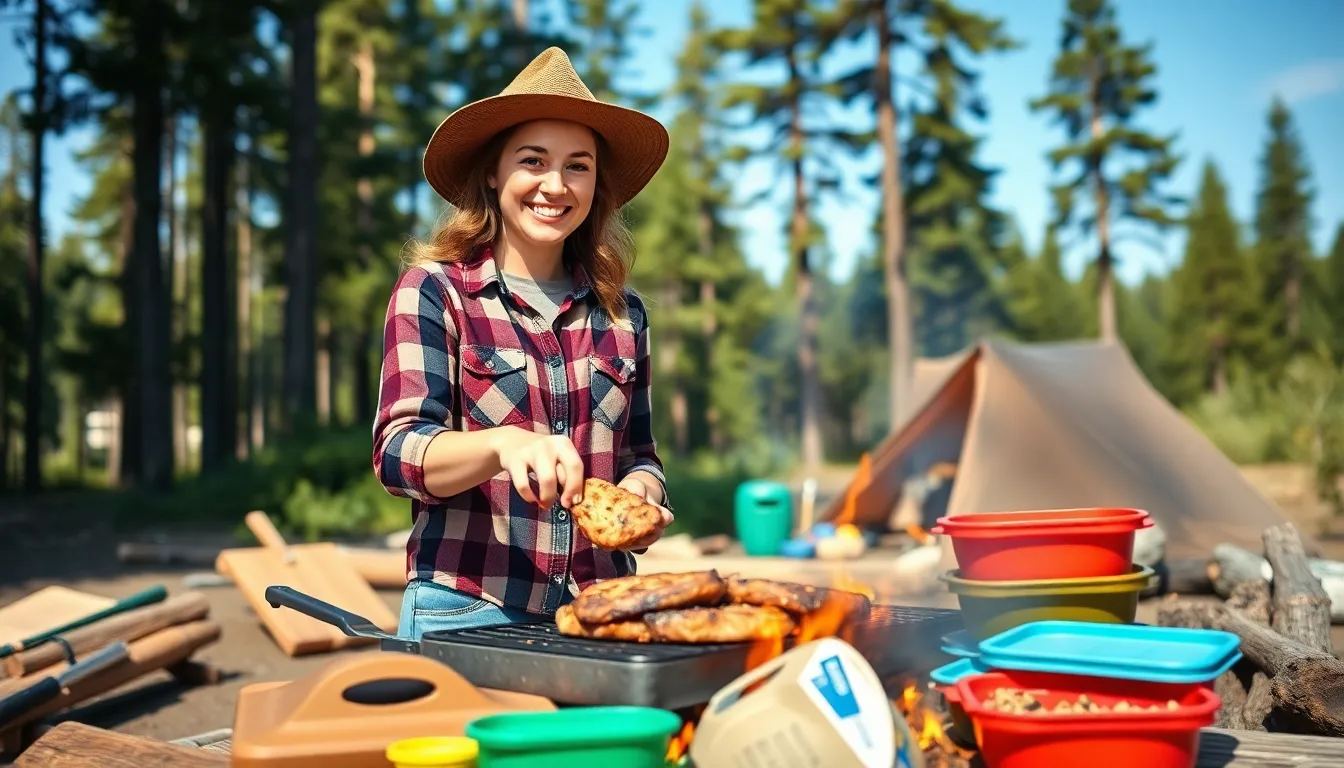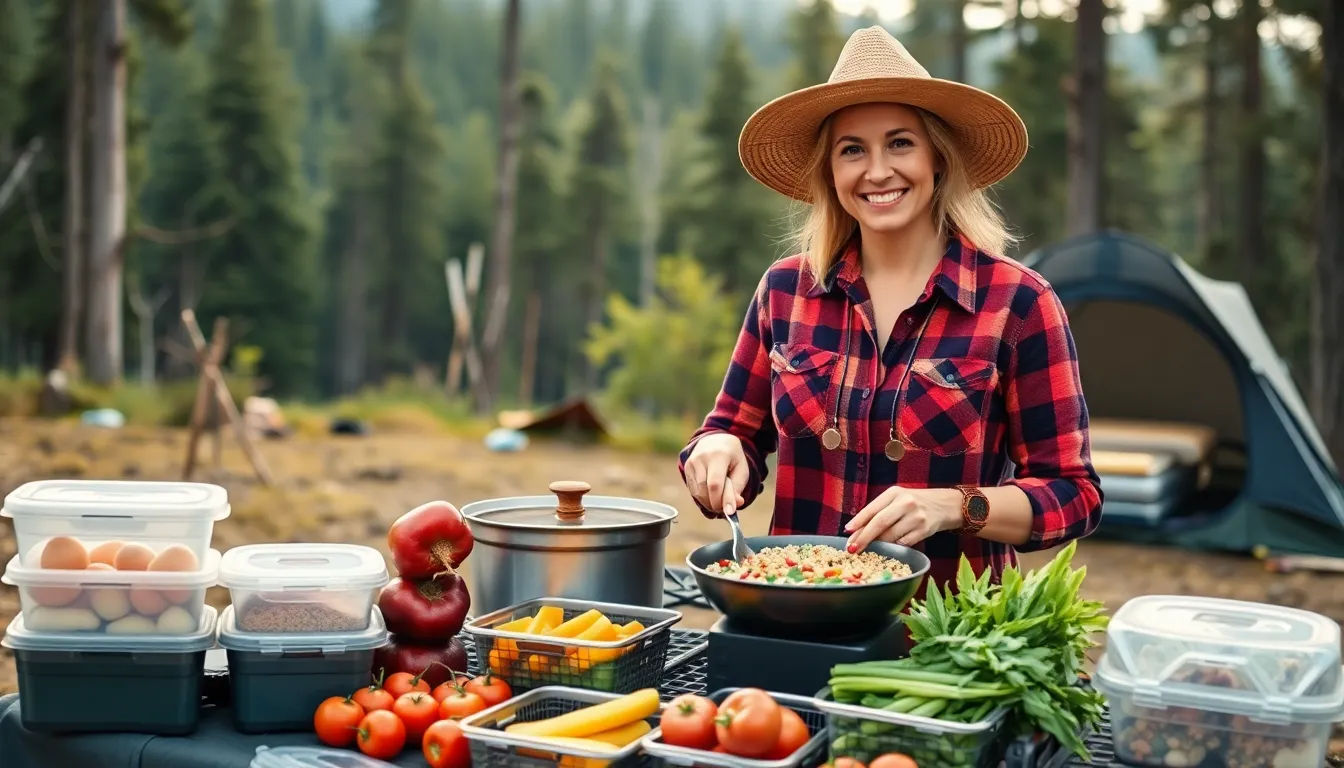Physical Address
304 North Cardinal St.
Dorchester Center, MA 02124

Camping is all about enjoying nature, but let’s be honest—nothing ruins a great trip faster than a soggy sandwich or burnt beans. Fear not! With the right camping cooking tips, outdoor cuisine can go from drab to fab faster than you can say “s’mores.” Imagine impressing your friends with gourmet meals cooked over a crackling fire while they struggle with their instant noodles.
Camping meals can transform with the right cooking gear. Essential tools enhance the outdoor cooking experience.
Cooking tools significantly impact meal prep and enjoyment. A durable cutting board provides a stable surface for chopping ingredients. A sharp knife simplifies food preparation, enabling quick slicing or dicing. A pot or pan with a lid is crucial for boiling, steaming, or frying. Measuring cups and spoons ensure accurate ingredient ratios, yielding consistent results. Finally, a sturdy spatula facilitates flipping and serving hot meals. These tools collectively empower campers to create delicious dishes with ease.
Portable cooking appliances elevate campsite cooking to a new level. A compact camp stove offers convenience for boiling water or heating meals. By using a portable grill, campers can enjoy the distinct flavor of grilled foods, enhancing their dining experience. An electric kettle provides quick boiling for coffee or tea, supporting a cozy atmosphere. Additionally, a solar oven utilizes sunlight to cook meals, making it energy-efficient. These appliances enhance versatility and aid in meal preparation under various conditions.

Meal planning simplifies cooking while camping. Organizing menus in advance helps ensure balanced and delicious meals.
Incorporate fresh vegetables into stir-fries for added nutrients and flavor. Prepare quinoa salad with canned beans, diced tomatoes, and bell peppers. Opt for wrap sandwiches filled with lean proteins like turkey or hummus, along with leafy greens. Consider cooking foil packets with fish or chicken, seasoned with herbs and veggies, for an easy cleanup. These recipes deliver both taste and nutrition, making them perfect for outdoor adventures.
Utilize airtight containers to keep foods fresh and prevent spoilage. Pack perishable items in cooler bags with ice packs for optimal temperature control. Designate a specific container for dry goods like pasta, rice, and snacks. Use resealable bags to save space and keep ingredients accessible. Maintaining organization with these storage solutions minimizes waste and maximizes enjoyment during camping trips.
Cooking outdoors presents unique challenges and great opportunities for creativity. Several techniques can enhance the camping cooking experience and produce delicious meals.
Grilling and fire cooking offer a direct method to prepare flavorful dishes. Campers should use a sturdy grill grate placed over hot coals for even cooking. Vegetables, meats, and seafood take on a smoky flavor when grilled. Skewers can simplify grilling small items, while foil packets keep food moist and easy to handle. Lighting a fire requires attention; ensure the flames are manageable before placing food on the grate. Using seasoned wood or charcoal can further enhance flavor. Always supervise the fire to maintain safety and prevent flare-ups.
Camp stoves provide efficient and controlled cooking options. It’s essential to choose a stove that meets specific cooking needs, whether it’s boiling water or simmering sauces. Position the stove on a stable surface to prevent accidents. Utilizing pots and pans designed for camp stoves helps optimize heat distribution. Keeping a close eye on cooking times ensures meals don’t overcook. Experimenting with different fuel types can improve efficiency, while pre-measuring ingredients saves time and reduces mess. A well-prepared camper knows the importance of adjustment to wind and elevation when cooking outdoors.
Safety during camping cooking ensures enjoyable outdoor experiences. Adhering to essential protocols minimizes risks associated with food preparation and fire usage.
Refrigeration isn’t possible at campsites, so managing food temperatures is critical. Store perishable items in coolers with ice packs to maintain freshness. Separating raw and cooked foods is vital to prevent cross-contamination. Use separate cutting boards and utensils for each food type. Regularly washing hands with soap and water keeps germs at bay; if unavailable, hand sanitizers serve as an alternative. Checking expiration dates and properly cooking proteins reduces foodborne illness risks. Bringing enough food supply for the days spent outdoors removes the need for last-minute purchases, which could involve unsafe food handling.
Creating a safe cooking environment requires proper fire management techniques. Selecting a designated cooking area away from tents and flammable materials minimizes hazards. Using a camp stove or designated fire pit ensures controlled cooking conditions. Always keep water or a fire extinguisher nearby for emergency purposes. Monitoring the fire while cooking prevents flare-ups and uncontrolled flames. Checking local regulations helps avoid violations that could lead to fines or dangerous situations. Extinguishing the fire completely after cooking ensures the campsite remains safe for all campers.
Camping cooking can transform any outdoor adventure into a culinary delight. With the right tools and techniques campers can create memorable meals that elevate their experience in nature. Planning meals ahead of time ensures balanced nutrition while simplifying preparation.
By utilizing portable cooking appliances and mastering outdoor cooking methods campers can impress their friends with delicious dishes. Prioritizing food safety and proper storage further enhances the enjoyment of every meal. Embracing these tips will not only make cooking easier but also create lasting memories around the campfire.